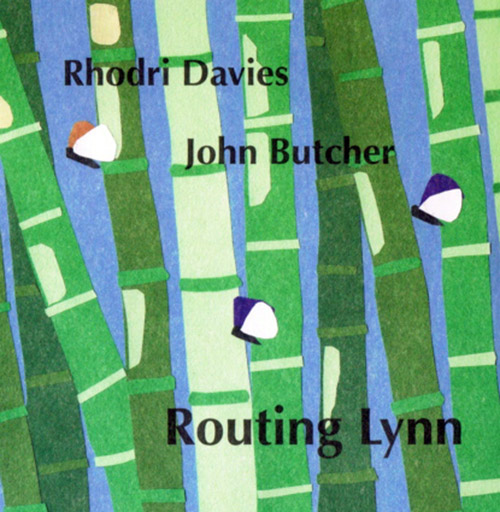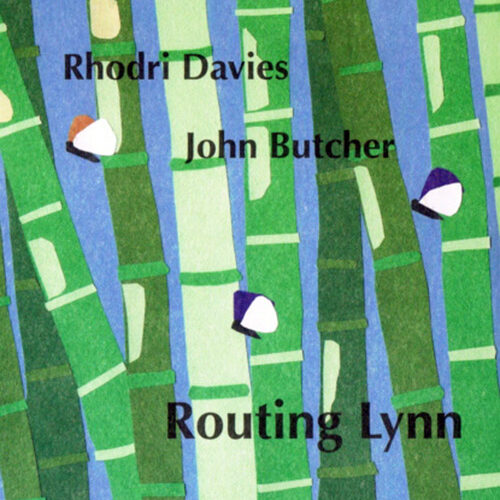The ever-prolific John Butcher shows no signs of slowing down at 61, and why should he, when inspiration seems to constantly be hovering within touching distance of his fingertips? If 2012’s Bell Trove Spools is perhaps the highlight of his solo career so far (and that throws the door open to a never-ending debate, given how many great works he’s produced over the years), his numerous collaborations since then, with luminaries such as Otomo Yoshihide, Fred Frith, Sachiko M and John Tilbury have provided constant succour for those of us who relish his singular approach to improv and the saxophone.
Routing Lynn, released at the tail-end of last year, is a document of a remarkable collaboration between Butcher and one of his regular collaborators, Welsh harpist Rhodri Davies, with whom he also performs as part of the Common Objects collective. In January 2014, the duo decamped to the wilds of Northumberland (and Newcastle), and the music they recorded there was captured by legendary sound artist (and ex-Cabaret Voltaire member) Chris Watson. The results were then performed live at Sage Gateshead, with Watson blending all these strands into the single slab that is Routing Lynn. The process sounds convoluted, but in the assured hands of Watson the results are never less than coherent, with both performers shining over the course of a single 35-minute stretch. The music is inspired by the landscapes, but not intrinsically of it: Davies has a fascination with cup and ring marked stones (something which he has also explored with Butcher on the latest Common Objects album), but Routing Lynn never falls into the trap of airy-fairy mysticism, instead allowing Butcher and Davies, two of Britain’s most intrepid improvisers, another setting in which to battle with their instruments and each other.
Rhodri Davies is often associated with the reductionist school of fierce, free-jazz inspired improv, and his playing involves frequent Ebow drones, strings banged rather than plucked (though not always) and moments where his instrument is distorted to the point of being barely recognisable, all techniques fans of his Wound Response album from 2012 will instantly recognise. Butcher works with the very foundational tools of his craft: air and saliva, with notes shortened or extended, often into registers one wouldn’t think possible. The track’s progression is non-linear, with lengthy drones blending into extended dual improvisations overflowing with distortion and noise. All around the pair flow the natural sounds captured by Chris Watson: birdsong, gales of wind, etc, creating a wide, outdoor canvas that at the same time is, in these hands, strangely hermetic.
By comparison, John Butcher’s solo album Nigezimu at first sounds rather sparse. Recorded live in Japan, although with the audience track apparently excised, it’s a potent document of Butcher at his most immediate and unfettered. From the very first notes of ‘Enrai’, I was transported back in time to the first occasion I went to see John Butcher live; about four or five years ago at ATP in the incongruous surroundings of Butlins. Eschewing the hard blowing favoured by some solo saxophonists such as Colin Stetson or even the deceptively subtle but usually loud Peter Brötzmann, Butcher constructs his improvisations with care and patience, starting quietly on ‘Enrai’ with softly fluttered notes. His use of space is fundamental: the first track was recorded in a church in Osaka, the second and third in a converted farm space in Fukaya, and there are notable differences in the atmospheres between the two, with the church’s naturally resonant reverb allowing the saxophonist to suspend notes in the ether, often dissolving them into pregnant silences. As the piece develops (over 26 minutes), with Butcher deploying increasingly dense overtones, strident high notes and circular breathing, it becomes almost symphonic, an epic exaltation of the power of his instrument and of his symbiosis with it. Apparently, ‘Enrai’ in Japanese means "distant thunder", and there’s no better way to encapsulate the track’s power.
The other two pieces, on soprano sax, sound initially more upbeat in comparison to ‘Enrai’s dense clusters, with bright clusters of notes tumbling rhythmically out of his horn. The sound, especially midway through ‘Uchimizu’, when Butcher draws out shrill, trilling motifs with remarkable speed, is akin to water racing down a hillside, or the fleeting songs of swooping flycatchers. Melodically, I’m reminded of certain symphonic works of the classical age, when instruments were used as metaphors for the natural world, and again, one marvels at the way Butcher creates such elaborate, evocative suites of sound using a solitary saxophone. Closer ‘Hamon’, at six minutes, is the shortest of the three pieces, and shares much of the spirit of ‘Uchimizu’, signing off the album with a joyful flourish of grace and beauty. In Butcher’s hands, decades of jazz and improv tradition are reimagined and personalised, resulting in a truly unique and instantly recognisable voice. Bell Trove Spools may still stand as his most distinctive and complete statement of late, but both Routing Lynn and Nigezimu show just how singular an artist John Butcher is both when working with like-minded visionaries, and on his own.
<div class="fb-comments" data-href="http://thequietus.com/articles/17568-rhodri-davies-john-butcher-routing-lynn-john-butcher-nigemizu-review” data-width="550">



